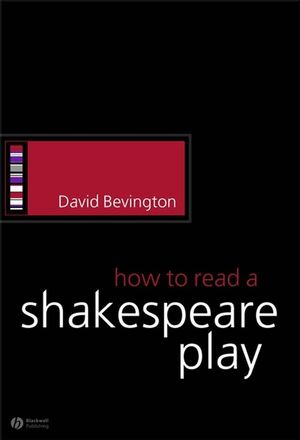|
Textbook
How to Read a Shakespeare PlayISBN: 978-1-4051-1396-0
Paperback
180 pages
June 2006, ©2006, Wiley-Blackwell
 This is a Print-on-Demand title. It will be printed specifically to fill your order. Please allow an additional 15-20 days delivery time. The book is not returnable.
Other Available Formats: Hardcover
|
||||||
"In just a few pages, the author manages to unearth the full
richness of the Bard, opening the reader's mind and asking
questions rather than providing glib, easy answers. This is a
terrific beginner's volume for the novice English literature
student tasked with studying the works of William Shakespeare, and
a valuable re-entry point for the intermediate Shakespeare reader
looking for additional analytical methods." (Simply
Shakespeare, November 2009)
“The first chapter is a fabulous, full-frontal, thirteen-page assault that both dispenses information and suggests effective questions that student readers might employ when reading a text in order to ‘read aggressively’ (p. 9). What is mildly revolutionary is that it is here, in print, ready to be easily disseminated to students and thus to more easily and readily articulate the type of engagement with a text that we hope and expect our students will undertake. Bevington challenges his readers to think in historical, theatrical, and characterological terms. Bevington’s list is instructive and at times brutally honest. Schools should consider investing heavily in this text for the benefit of their pupils; college or university-level students would also be aided by Bevington’s straightforward, avuncular reading advice.” (Year's Work in English Studies, 2008)
“The first chapter is a fabulous, full-frontal, thirteen-page assault that both dispenses information and suggests effective questions that student readers might employ when reading a text in order to ‘read aggressively’ (p. 9). What is mildly revolutionary is that it is here, in print, ready to be easily disseminated to students and thus to more easily and readily articulate the type of engagement with a text that we hope and expect our students will undertake. Bevington challenges his readers to think in historical, theatrical, and characterological terms. Bevington’s list is instructive and at times brutally honest. Schools should consider investing heavily in this text for the benefit of their pupils; college or university-level students would also be aided by Bevington’s straightforward, avuncular reading advice.” (Year's Work in English Studies, 2008)



